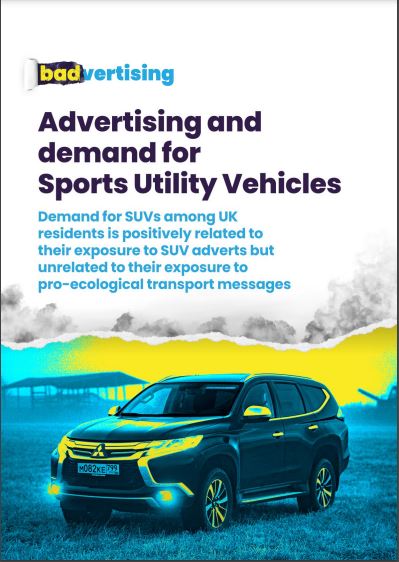A ground breaking new study reveals that demand for climate-damaging SUVs is higher when people are exposed to advertising and that even the small number of messages encouraging ‘greener’ transport appear to get drowned out by the car adverts.
The new primary research using sophisticated statistical tools has for the first time confirmed the suspicion that exposure to advertising is associated with damaging personal transport choices, specifically demand for heavily polluting SUVs. Conversely, the study found that exposure to messages encouraging environmentally positive transport options made no difference to people’s demand for SUVs. It points to the innovative conclusion that the reduction and removal of SUV advertising could actually be more effective in bringing about lower impact, more climate-friendly transport choices than merely exhorting people to ‘do the right thing’ with ‘green’ messaging.
The study – Advertising and Demand for Sports Utility Vehicles – focused on the UK as an example of a wealthy, high-consuming economy and was led by a world leading authority on values, behaviour, and consumer culture, Prof Tim Kasser, and was commissioned by the New Weather Institute for the Badvertising campaign. It looked at exposure to SUV advertising in people who owned an SUV, who owned a standard (not large) car, and who owned no vehicle. Subjects in the study reported on their exposure both to SUV adverts and to messages encouraging the use of more environmentally-friendly travel options, such as using public transport. The study had three key findings.
It points to the innovative conclusion that the reduction and removal of SUV advertising could actually be more effective in bringing about lower impact, more climate-friendly transport choices than merely exhorting people to ‘do the right thing’ with ‘green’ messaging.

First, exposure to SUV adverts is significantly positively associated with current ownership of an SUV – for example, compared to a person who reports that s/he is “rarely” exposed to SUV advertisements, a person who reports that s/he is “sometimes” exposed to SUV advertisements is 71% more likely to own an SUV than a standard car, and is 250% more likely to own an SUV than to own no motor vehicle.
Secondly, exposure to SUV adverts is also positively associated with desire to purchase an SUV – for example, a person who reports being “sometimes” exposed to SUV advertising would score almost a half point higher on the 5-point rating scale of desire to purchase an SUV than would someone who reports being “rarely” exposed to SUV advertising.
And, thirdly and intriguingly given a more general faith relying on appeals to people’s better natures, in contrast, exposure to pro-ecological transport messages has no relation to SUV demand – such messages appear to be, in effect, drowned out by SUV adverts.
“These findings suggest that governmental and campaigning groups that are trying to reduce CO2 emissions from SUVs may do well to focus at least as much on ending the practice of SUV advertising as on sending pro-ecological transport messages to the general public,” says the lead report author, Prof Tim Kasser.
The report was triggered by concern that SUV demand plays an increasing and outsize role in climate damaging carbon emissions, and that advertising regulators were not acting adequately against the irresponsible promotion of the vehicles. SUVs, which use on average about a quarter more energy than a medium sized car to travel the same distance, have seen their market share increase dramatically in recent years. SUVs made up 10% of new UK car registrations in 2010, but that had leapt to 42% by 2019, pushed by a shift in advertising spending towards SUV promotion. One of the arguments, later disproven, used by the tobacco industry against advertising controls was that its adverts didn’t ‘make people smoke’, but merely influenced which cigarettes they bought. The new study also cites other recent evidence that advertising does work in driving car sales, with one campaign by car maker Audi credited with 133,000 additional sales between 2015-2017.
Governments rely on ‘nudging’ people to change behaviour for climate action, but adverts keep nudging people the wrong way.
The transport sector accounts for about 25% of CO2 emissions in Europe and 34% in the UK.Particular climate consequences from increased SUV sales were recently identified by the International Energy Agency (IEA). Over the last decade according to the IEA, “SUVs were the only area of energy-related emissions growth in advanced economies,” that, “close to 97% of SUVs sold … had fossil fuel-powered engines,” and crucially that, “the reduction in oil demand from the increased share of electric vehicles in the overall car market … was completely cancelled out by the growth in SUV sales.”
“Our findings are consistent with other research which has found that being exposed to advertising for other ecologically-damaging services such as leisure airline flights, and products like beef, is related to higher demand,” says co-author of the report, Associate Professor, Monica Guillen Royo, “The findings also extend those of an earlier study which found that Germans’ consumption of electronics, fashion, and leisure airline flights is essentially unrelated to their exposure to eco-friendly messages, but was positively predicted by their exposure to adverts for those products and services.”
Governments rely on ‘nudging’ people to change behaviour for climate action, but adverts keep nudging people the wrong way. The implication for effective action to change transport policy and infrastructure to be more environmentally sustainable is that it is at least as important to remove from the cultural environment messages that encourage polluting choices as it is to convey green options. While positive messages about using public transport, riding a bicycle, or buying less ecologically-damaging motor vehicles appear to be effectively drowned out by SUV promotion of SUVs, it makes sense to limit people’s exposure to SUV adverts. It seems to be a case of having to relearn the lessons of why cigarette advertising was ended to protect public health. This time, however, the potential benefits are much bigger, and include planetary ecological health.
The report calls for an end to the advertising of at least the dirtiest third of the most polluting vehicles sold in the UK, and for the UK Advertising Standards Authority (ASA) and Committee of Advertising Practice to renew its commitment to tackle climate change by implementing new codes of practice concerning SUV advertising and to pro-actively implement them. There are recommendations too for creative agencies and their media partners to reject advertising work for polluting SUV vehicles. Its findings will also be seen as support for the European Citizens’ Initiative (ECI) to end a range of advertising for high carbon products, including SUVs.
Take action: you can take action against adverts fuelling the climate emergency by clicking here.














